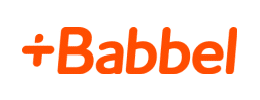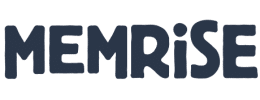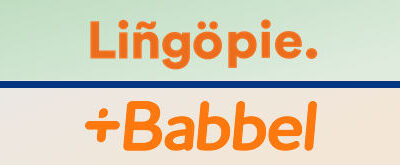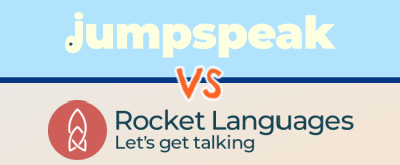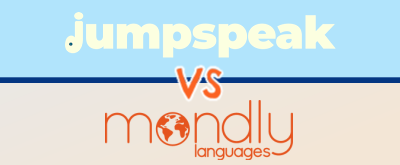Babbel and Memrise are two of the most popular language learning apps on the market, and are very similar in several key respects, including style, interface and price. This often makes it hard for people to choose between the pair. In this comparison, we highlight the major differences between these two language learning apps to hopefully make your decision a little easier.
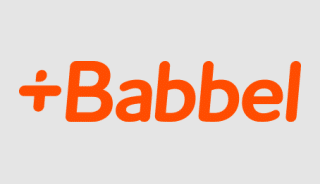
Sale: 55% OFF
Applied in Cart
|
$8-$15/mo |
The perfect app for beginners and budget shoppers. A nice introductory program, with engaging and short lessons built on foundational content. |
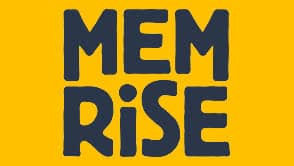
Sale: 50% OFF
Applied In Cart
|
$8-$15/mo |
We see Memrise as being a great app for those looking to build out their vocabulary. Lacks grammar instruction, but good for vocab retention. |
Editor’s Choice
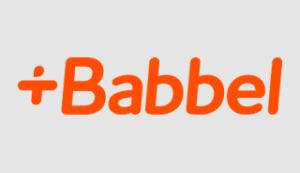
Babbel
- Multiple Subscription Options
- 20-Day Money Back Guarantee
Pros
- Lessons are more comprehensive than those from Memrise
- Diverse set of practice drills across reading, writing, speaking, and listening
- Quick and accurate speech recognition technology
- Helpful grammar instruction integrated into lessons
- Live classes available for additional fee
Cons
- More expensive than Memrise (though still affordable)
- Wish lessons included more visuals
How Both Language Apps Work
Before diving straight into the pros and cons of these two apps, I am guessing it would helpful to have a little background on how each program works. Let me break it down for you.
Memrise
The Memrise app has a pretty unique program structure and teaching framework. In some respects, it’s much more like a vocabulary or flashcard-based tool than a traditional language learning course.
Rather than using a linear learning path where you work through lessons that build on one another (like you get with Babbel), Memrise has a bunch of courses in their program which are generated by both the Memrise team, as well as other Memrise users. With this library-style approach, you can kind of pick and choose which course you want to take.
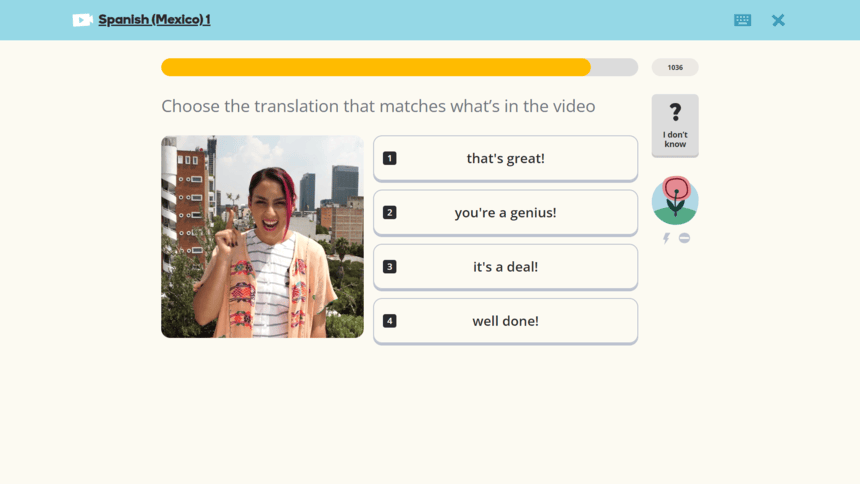
If you are learning Spanish, for example, you can start with Memrise’s Spanish 1 course (curated by the Memrise team), or pick a random user-generated Spanish course if you want.
Obviously, most people will start with the basic Memrise Spanish 1 course, then go onto Memrise Spanish 2, and so on from there, but the structure of the program is definitely more free flowing than you see with Babbel.
In any event, once you select a course, even the Memrise lessons are a little different from the Babbel lessons (and other apps for that matter). Rather than using fixed lessons which are a certain length, you instead pick how many words you want to learn per day. Then you do your daily session and learn that many words.
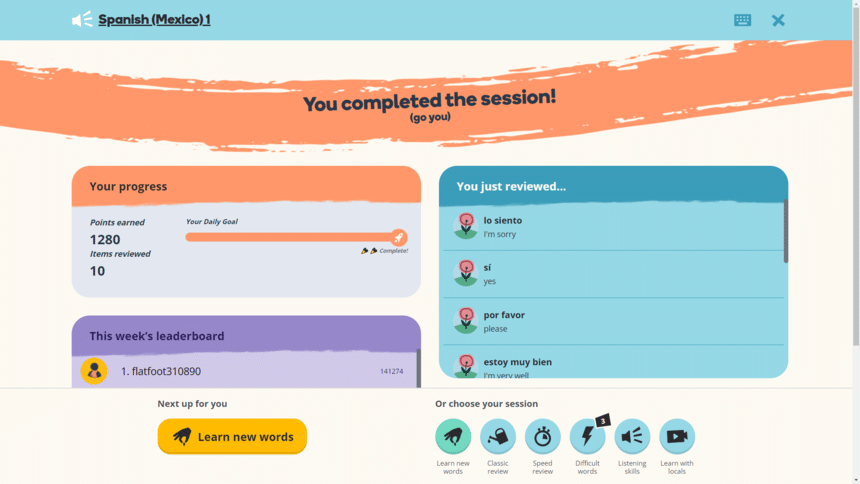
As for the exercises in each session to teach you those words, it’s pretty diverse. There are short video clips, listening drills, typing exercises, matching word pairs, and a few more standard drill types.
That’s Memrise from a high level though. You choose a course, set your daily word goal, and start learning with some rapid fire drills and exercises.
Babbel
Comparatively, Babbel is pretty different from Memrise. Rather than learning a certain number of words each day, you work through more comprehensive lessons which each teach you new vocabulary plus grammar and other important teaching points about the language you’re learning.
In this sense, it’s much more of a traditional language program.
Assuming you have no working knowledge of the language you’re learning, you’ll start with the very first lesson in the Newcomer level and shoot to complete one lesson per day (or at least a few lessons per week).
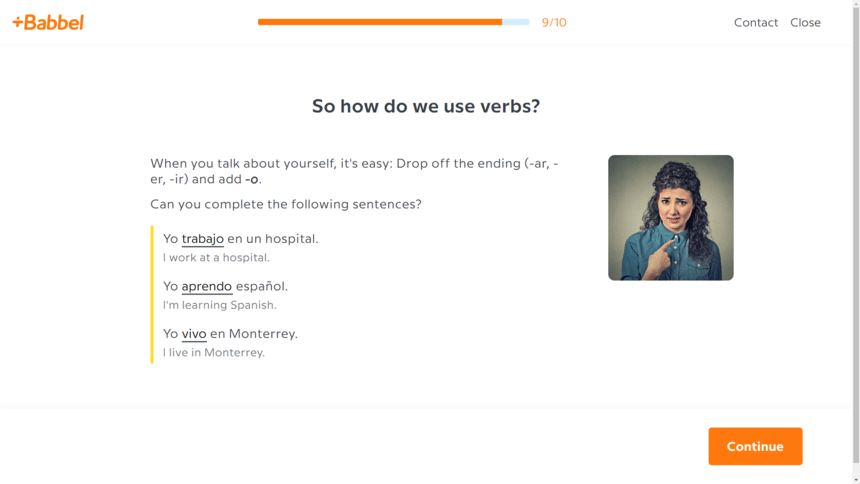
As for the lessons themselves, each one is pretty short in length. On average, I would say that each took me about 15 minutes to complete.
Each Babbel lesson is made up of several quick-hit, interactive exercises. This includes listen-and-repeat exercises, digital flashcards, fill-in-the-blanks, matching pairs, matching phrases to images, completing mock conversations, short instructional tips on grammar, and a few more.
Overall, it is a very diverse approach to learning in terms of format, and is generally more varied than Memrise’s learning sessions, especially given its grammar coverage.
Not to mention, outside of the main Babbel lessons, there are also daily review sessions where you get spaced repetition on the vocab you’ve already learned in older lessons. Plus, they toss in some cool extras, like games and podcasts.
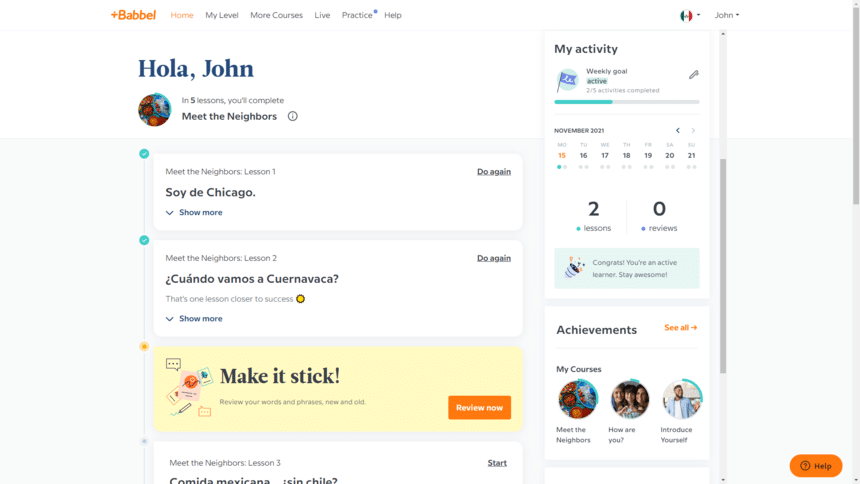
In looking at how the two companies compare within the “big picture,” I would say the Memrise program is more about learning words and new vocab through rapid fire drills in various courses, while the Babbel lessons are a little more varied and include deeper grammar coverage.
Cost Comparison
Memrise has a pretty simple pricing model with just three plans. You can pay monthly as you go for $8.50 per month. Then there’s an annual subscription which costs $60 per year. Or lastly, you can buy a lifetime membership for $120.
Babbel has a pretty similar model, but with more subscription options. They offer a monthly pay-as-you-go plan, a 3-month plan, a 6-month plan, and a 12-month plan. Those subscription plans all range from around $6 to $14 per month after discounts. Plus, somewhat similar to Memrise, they also have a lifetime plan, which includes access to all Babbel languages for $300.
Thus, in terms of pricing, Memrise is cheaper than Babbel by a couple dollars per month. It’s not a huge disparity, as you’re likely looking at less than $10 per month for a subscription to either course, but this could be enough to make a difference to some people.
Reasons To Choose Babbel
After having a chance to use and review both of these language apps, we ultimately give Babbel a better grade. It is simply a more complete and effective language learning program. I will highlight a few of its major strengths below.
More Robust Learning Framework
The thing I like most about Babbel’s program over Memrise is the teaching framework. As noted, Memrise is a vocab-driven program, while Babbel is more comprehensive, giving you coverage of both vocab and grammar.
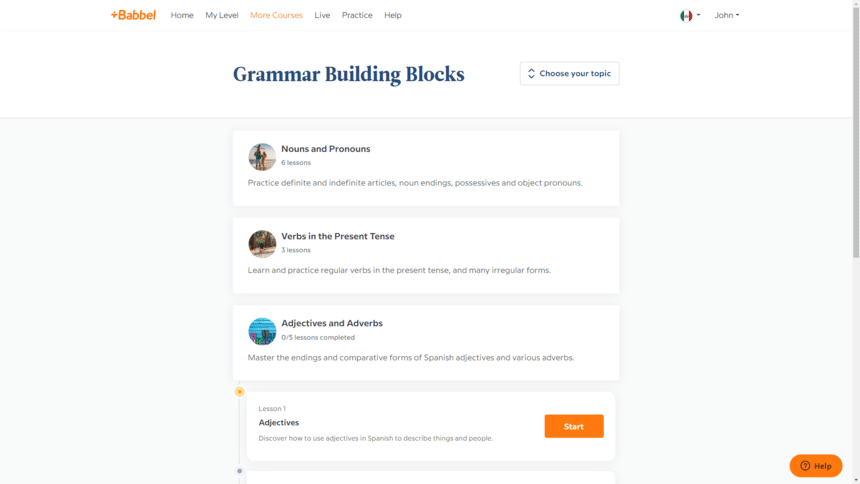
The reality is that you can’t become proficient in a new language without both of these elements. If you only need vocabulary because you already have grammar down with a sufficient understanding of sentence structures and conjugations, then Memrise is perfect for that situation.
However, if you’re trying to learn a new language from scratch (or even close to), you’re going to need both elements. Thus, if you’re trying to just pick one app, Babbel should be the choice in my eyes.
Variety of Exercises
Another highlight of the Babbel program is the variety of their exercises. Both apps actually use a pretty diverse set of drills to teach, and Memrise is better than other apps in my opinion, but between these two, I prefer Babbel’s mix of drills.
The Babbel lessons offer a ton of variety, which keeps things more balanced and engaging as you go.
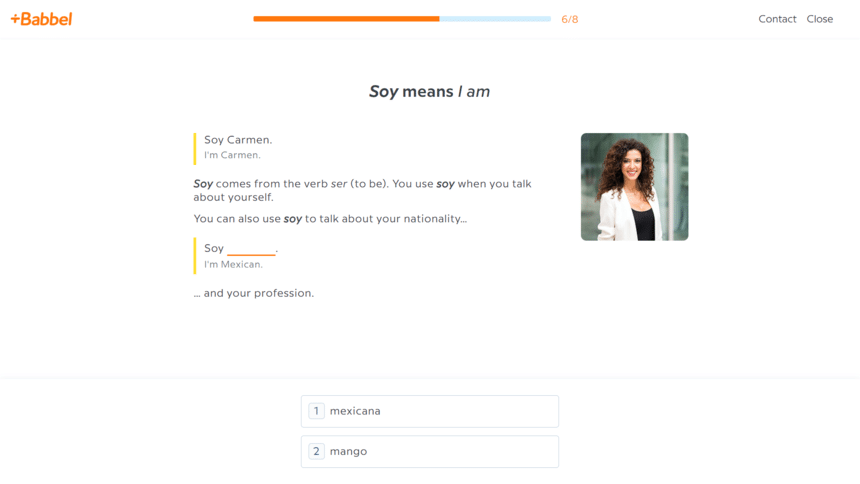
As noted above, there are listen-and-repeat exercises, digital flashcards, fill-in-the-blanks, matching pairs, matching phrases to images, mock conversations, short instructional tips on grammar, and some others.
For me, the diversity of Babbel’s drills just kept me more engaged during lessons.
Speech Recognition Technology
Lastly, the third advantage of the Babbel app worth calling out is their speech recognition technology. Here’s the deal.
Memrise does have speech software to help you with your pronunciation, but I only saw it used in the mobile app, and very infrequently at that. It’s a little odd. They have it in their program, but it’s not really utilized.
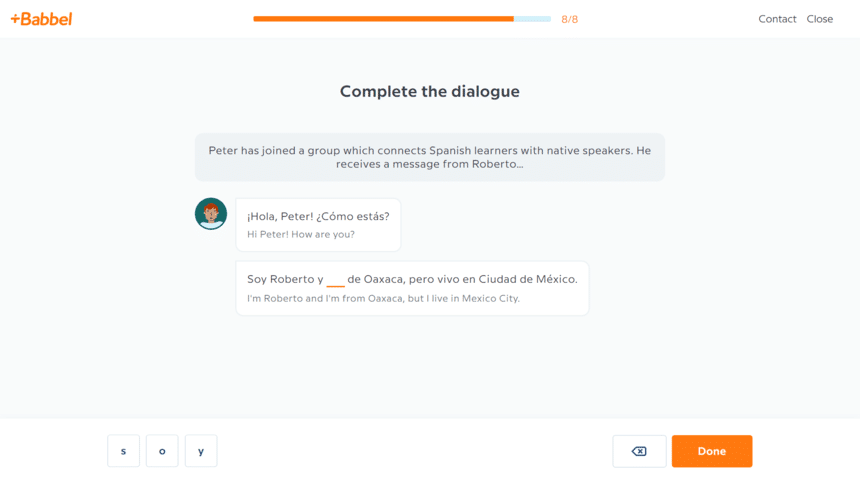
In contrast, Babbel has speech recognition software, and it’s used in every single lesson. It’s not perfect or my favorite speech tech on the market (see Rocket Languages for that), but it’s not bad.
It will tell you when you say something wrong and have you repeat the phrase, or give you a quick thumbs up when you nail your pronunciation.
The feedback aspect isn’t anything special, but it is accurate, and having that double check on your pronunciation is a nice value add.

Memrise
- Free Version Available
- Money Back Guarantee
Pros
- Lessons are ideal for visual learners (videos of native speakers)
- Ability to adjust lesson length to your needs
- User-generated courses cover niche topics
- Spaced review system helps with vocabulary retention
Cons
- User experience differs by device
- No in-depth conversational practice
- Limited grammar content
Reasons To Choose Memrise
Now that we have covered the benefits of using Babbel, I will cover the major reasons why you may want to consider using Memrise.
Video Clips of Native Speakers
The first advantage of the Memrise program is its use of video clips in lessons. Every lesson features a number of short video clips which show fluent speakers actually speaking the words and phrases that you’re learning.
To me, this is a major advantage for Memrise, as it’s something completely missing from the Babbel program.
Babbel uses a fair number of images throughout its lessons, as well as audio dialogue, but no video.
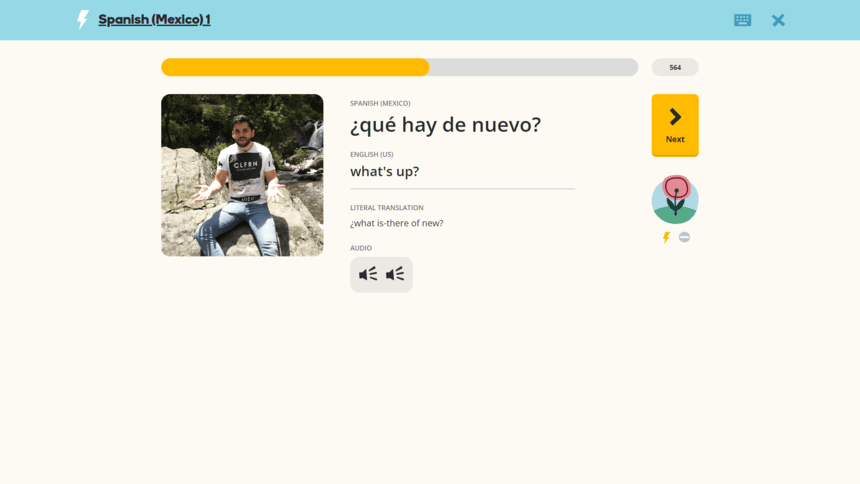
Personally, I think there is a lot of value in video, and it can be a powerful teaching tool. You get to see fluent speakers’ body language and facial expressions, and you also get a visual memory aid to associate with the new words or phrases.
Thus, this is a big win for Memrise in my book, as it is something that visual learners can really benefit from.
Coverage of Niche Topics
Another aspect of the Memrise program that I haven’t seen other apps offer is allowing their users to generate and share courses.
In short, Memrise allows users to create their own courses on specific topics with exercises, videos and new vocab.
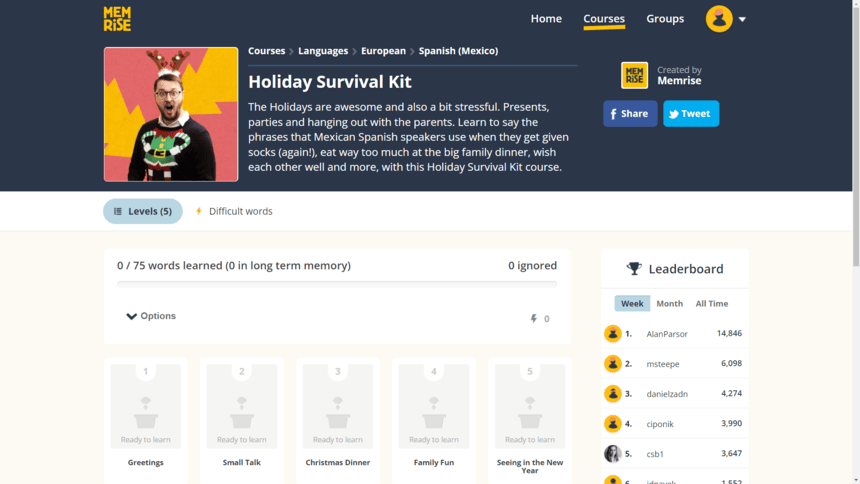
The cool thing is that most of the user generated courses cover really niche topics you otherwise wouldn’t learn vocab for in standard lessons, such as terminology for soccer rules, auto parts, and movies.
In my opinion, once you’ve developed a nice vocabulary base and learned the essentials, these courses are great for developing language skills around things you like or need to learn for work.
Spaced Review System
The final noteworthy aspect of the Memrise app is their spaced review system. Both apps actually use and rely pretty heavily on spaced repetition, but they just do it in slightly different ways.
Babbel’s approach is more direct. They have a separate review function where they prompt you to review old vocab every day when you log in.
Memrise, on the other hand, sort of integrates their review function directly into the program with a speed review feature.
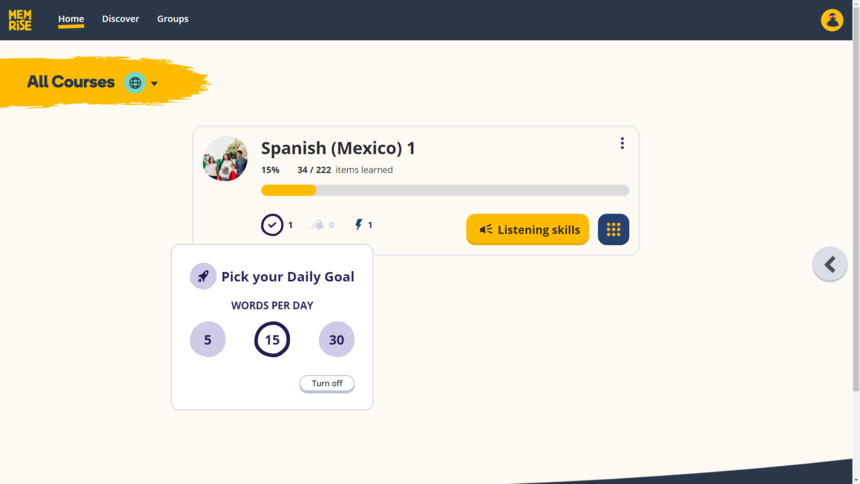
While I like both, if I had to pick one system, I think I prefer Memrise’s more integrated approach.
Plus, this is kind of a small point, but I like how Memrise uses a little flower icon to show how far you’ve come in learning your new words.
A new word will start out as a seed, and every time you review that word, it will show the little flower growing and growing until it’s in full bloom (meaning you should know that word without hesitation). It’s a silly little feature, but I like it alongside their spaced review system.
Final Verdict: Babbel or Memrise?
If you’re looking to choose just one of these two apps to learn a new language, in my opinion, this is sort of an easy win for Babbel. As discussed above, the interesting thing about Memrise is that it’s really just a vocab-based app driven largely by flashcard-type drills and spaced review.
If building out your vocab base is all that you need, then I really like Memrise for that. It’s a great program from that perspective. However, in terms of more fulsome language learning, I have to give the edge to Babbel.
Their lessons are more comprehensive, dive deeper into grammar with critical teaching points, and the lessons are more varied in terms of drills. Thus, given that both programs are within a buck or two of each other in terms of cost, I would go with Babbel.
After testing each app for a while now, I believe Babbel offers the more well-rounded and effective language courses from top to bottom. With more comprehensive lessons, deeper grammar coverage, and greater drill variety, I found it to be more engaging and effective.
The language lessons from Babbel are more comprehensive than those from Memrise. Not only do the Babbel lessons include more variety in terms of drills and exercises, but Babbel also makes grammar instruction a priority within its coursework. That being said, Memrise is a great tool for building our your vocab base.
Our team believes Babbel is the better choice if you are looking to learn a totally new language quickly, as its lesson structure and overall curriculum is more robust. You will learn new vocab faster with Memrise, but it lacks some of the grammar fundamentals.

